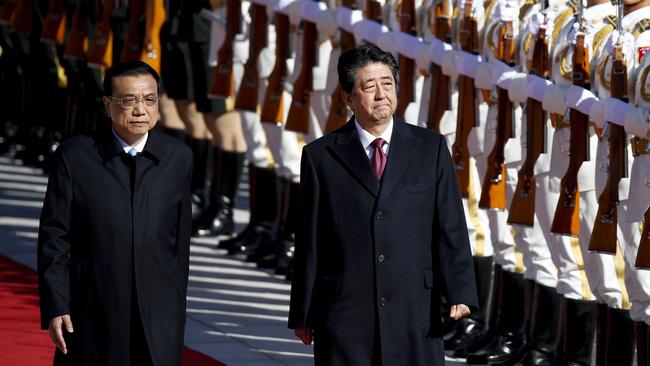Beijing to open new silk road to Tokyo
China is using this week’s visit by Shinzo Abe to encourage Japan to become involved in the belt and road initiative.

China is using this week’s visit to Beijing by Japanese Prime Minister Shinzo Abe to encourage Japan to become involved in some of President Xi Jinping’s ambitious Belt and Road projects.
“China welcomes Japan to take part in the Belt and Road Initiative,” Premier Li Keqiang told China’s state-run CCTV.
Mr Li said China and Japan needed to step up co-operation to foster mutual trust and work together to protect the global trading system.
Japan has held off signing up to Mr Xi’s Belt and Road Initiative but has indicated it would like to look at ways it could work with China in other countries.
How Mr Abe handles China’s push for Japan’s involvement could become a blueprint for Canberra, which has also held off signing up to the BRI.
Mr Li’s offer to join the BRI was made during Mr Abe’s three-day visit, ending today, the first to China by a Japanese prime minister in seven years.
He said that China and Japan had to “stick to the path of peace, friendship and co-operation to build a more mature and consolidated relationship”.
The relationship has been marred by long-standing tensions, including the history of Japanese invasion and ill treatment of Chinese from the first Sino-Japanese war of 1894-5 until the end of the World War II, as well as competing claims to islands in the East China Sea.
But Donald Trump’s protectionist push has worried both countries, which also see the merit of closer ties between the two Asian economic superpowers.
The US President’s outright hostility to China provides another incentive for Beijing to bolster relations with its neighbours.
Speaking after his arrival in Beijing, Mr Abe said he wanted to move relations with China into a “new era of co-operation”.
“Today Japan and China are playing an essential role in economic growth, not only in Asia but in the world,” he said. “As problems that cannot be resolved by one country alone have arisen, the time has come for Japan and China to jointly contribute to world peace and prosperity.”
During this week’s meetings a raft of deals were expected to be signed by companies from Japan and China. Mr Abe arrived in Beijing on Thursday with a contingent of 500 business leaders.
Mr Abe attended a forum on infrastructure yesterday and was to have dinner last night with Mr Xi.
Speaking after a ceremony to mark the 40th anniversary of the signing of Japan-China Peace Treaty, Mr Li acknowledged the past tensions in the relationship.
“The China-Japan relationship has gone through wind and rain in the past four decades, yet peace, friendship and co-operation have always been the mainstream. The elder generation of leaders of both countries showed great foresight and made a correct assessment of the situation 40 years ago to sign the treaty,” he said.
“On the occasion of the 40th anniversary of the treaty, we need to adhere to the general direction of peace, friendship and co-operation, and conform to the trend of the times so as to jointly build more mature, steady and progressive China-Japan ties. We welcome Japan to take more active participation in the new round of China’s reform and opening up, and continue win-win co-operation.”
He urged Japan to continue to work positively with China, including potentially on BRI projects. “The consensus that China and Japan are partners rather than mutual threats should be better implemented in concrete actions,” he said. “The two countries need to manage differences and problems constructively on the basis of the principles set in the four political documents between China and Japan and in the spirit of ‘taking history as a mirror and facing to the future’,” Mr Li said.
The two countries were also expected to reaffirm their pledges to co-operate on North Korea. While Mr Trump and North Korean leader Kim Jong-un met in Singapore in June there have been questions on how active the North Koreans have been on moving towards denuclearisation.
Mr Abe has moved to improve ties with China over the past year, but his moves to revive the quadrilateral security dialogue, an informal four-way relationship with Australia, the US and India on security issues, have angered China. The quad is widely seen in China as an attempt to constrain China’s growing influence.
This week’s visit follows a visit by Mr Li to Tokyo in May and meetings between Mr Abe and Mr Xi in Russia in September.



